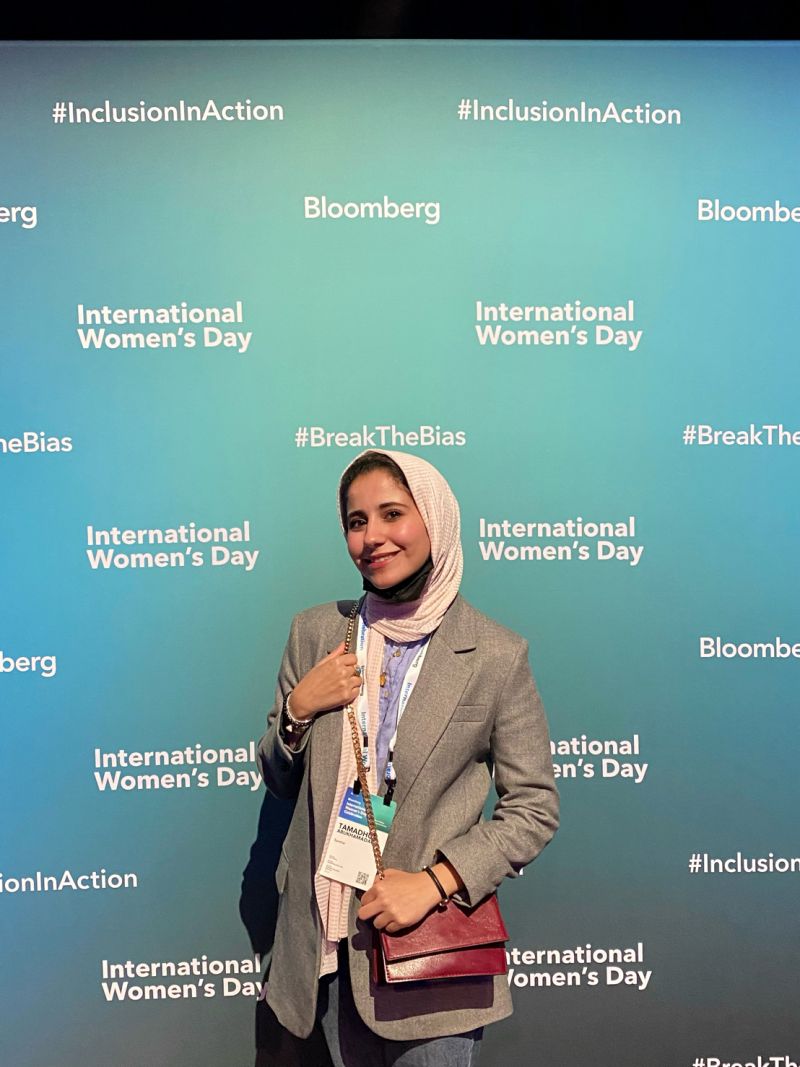African Women In Tech; Tamadur Almahdi Discusses, Tech, Empowerment, Participation

In 21st-century Africa, a lot has evolved. The continent has witnessed growth in diversity, innovations, technology and many more. This has created leaps of development for the developing continent. One of the major evolution that has gradually taken place is the gender inclusion and empowerment of African women in technology.
Without going down history lane, there has been a major emphasis on gender inequality and inclusion in Africa. In 2015 the proposed Sustainable Development Goals for Africa noted the importance of gender equality and empowerment for women and girls. So far the continent has witnessed more women inclusion, as women have risen to lead fundraising startups, and hold recognizable positions within startups.
Without a doubt, more women-led/founded startups have been springing up across the continent, yet it seems that more needs to be done to keep the development on. According to Business Trumpet, women-led startups raised a total of $203.2 million in 2022, out of the $2,692,607,000 that was raised by African startups in the year. This is a reduction from the $288 million the gender raised the previous year. While the challenges are not only seen in the funding and motivation of women in tech, there are also a few obstacles women in African startups tackle. These are obstacles that go across the board be it as a female founder or as a woman holding a position in an African startup.
Speaking with The Ouut in a recent interview, Speetar’s Chief Of Staff and a 2022 TechWomen Fellow, Tamadur Almahdi, discuss the reality of women in Africa’s tech ecosystem. She gives insight into the onboarding and recognization of women in tech in Africa.
The Realities of African Women In Tech
While speaking on the participation and success of women in technology, Tamadur noted the lack of female role models in the ecosystem, especially in the North African tech ecosystem. In her words ” I think one of the barriers is not having so many women role models. As you know you can’t be what you can’t see, so if you can’t see some women represented in technology, it makes it harder for other women to come into the field. The reality is as women progress in technology, they end up finding fewer women to look up to in the field.” According to research, women take up only 30% of tech professionals in Africa. While women-led startups see fewer funding activities, this ecosystem also witnesses an underpopulation of women.
” Underrepresentation is a barrier, another barrier is the pressure of the field. For some women who end up going into technology, they would progress up to a certain limit, and then at a certain point, they will not be able to cope with the self, job and community pressures. This will include personal development and expectations from women in society. these are also part of the reason most women end up quitting”, Tamadur said
While the continent continues to produce various programs to launch women in technology, such as She Codes, She Hacks Africa, Women Techster Fellowship and the like, it seems there is a lacking of the structure that can keep them in tech. Even as the gender struggles with representation and consistency, underappreciation is also in sight. Although this is evident in the division of funding rounds the continent witnesses annually. tech skilled women within startups are predisposed to underappreciation traits. A report by First Point in 2019, noted that about 42% of women in technology perceive that their contributions and voices are underappreciated.
“Women are more likely to do the work, that is behind the scenes, and take on the detail-oriented tasks. Even though these tasks do not lead to a big outcome but they are also important to the project, still, these tasks end up unrecognized. The continuous unrecognition of women’s impact in various organizational projects can leave them feeling unappreciated, and not good enough and could ultimately mean they leave the job they are really good at and really love” she said.
In as much as there can be a solution to every challenge, there are important steps that must be taken by notable figures in the African tech system to make women’s inclusion in the industry more of a reality than a facade. According to Tamadur, “I think what is missing is decision-makers, and leaders in organizations have to be involved in this sort of thing. Decision-makers have to be involved in this issue because so many people seem not to see it as one. It is their responsibility to create policies and initiatives that can be established to make it easier for women in tech.”
Tamadur Almahdi X Speetar
Tamadur has been the Chief of Staff at Libyan Helthtech start-up Speetar for the past 3 years. The startup functions as a telehealth startup that provides accessible, affordable and quality healthcare for adverse health conditions, Speetar focuses on conflict-affected communities.” What makes our solution unique is that it is tailored to patients with low technological, financial or health literacy. It is basically for marginalized communities who would have no access to healthcare or otherwise”
Project Speetar was ideated back in 2016 and its solutions were officially launched in 2020. According to Tamadur, the team has been able to impact 2 million people across its location of operation. Other services the platform render include physician consultation where users are able to book appointments and speak with a doctor virtually, and also diagnosis and prescription services.
The health startup has been able to partner with about 12 international organizations which include Harvard Innovation lab, MasterCard Foundation, National Center for Disease Control Libya and many more. In line with encouraging women in tech, Speetar sets out schemes to encourage women within its organization. ” One of our goals as an organization is to have more women in leadership and to make sure that women are represented. We have metrics to track these efforts and to make sure that we are seeing actual progress” It helps us know that we are not just talking about women’s empowerment but we are actually tracking that goal,” Tamadur said.
Tamadur Almahdi is a graduate of Pharmacy from the University of Benghazi Libya Tama launched into technology through her participation in the “She Codes” training programme. Over the years she has been involved in activities that intercept healthcare with technology. She is also actively interested in programmes that empower women and youth in technology within her community. Tamadur has been recognized by some international platforms. She became a Tech Woman Awardee in 2022 and was also recognized by the Women Innovators Programme in the Arab region, UNDP. She is likewise a fellow of the Delliotte Mentoring Programme.
